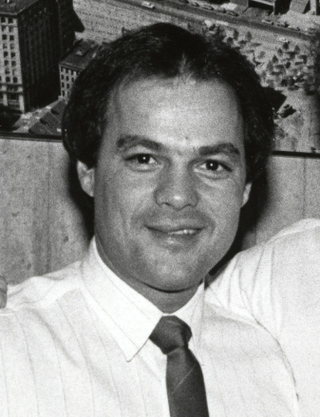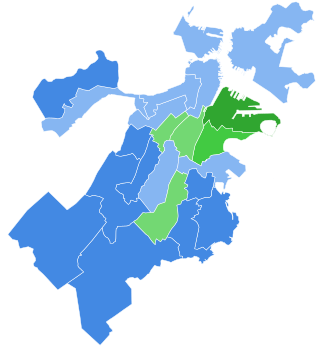
Malcolm Edwin Nichols was a journalist and American politician. Nichols served as the Mayor of Boston in the late 1920s. He came from a Boston Brahmin family and is the most recent Republican to serve in that post.

Robert Edward Travaglini is an American politician and lobbyist. From 2003 to 2007, Travaglini served as President of the Massachusetts Senate. He represented the first Middlesex and Suffolk senate district, encompassing portions of Boston, Cambridge, Revere, and Winthrop.

The Boston mayoral election of 1967 occurred on Tuesday, November 7, 1967, between Secretary of the Commonwealth Kevin White and Boston School Committee member Louise Day Hicks. White was elected to his first term, and inaugurated on Monday, January 1, 1968.

The Boston mayoral election of 1959 occurred on Tuesday, November 3, 1959, between former Boston City Council member John Frederick Collins and President of the Massachusetts Senate John E. Powers. Collins was elected to his first term, and was inaugurated on Monday, January 4, 1960.

Thomas Charles O'Brien was an American attorney and politician who served as District Attorney of Suffolk County, Massachusetts and was the United States vice-presidential nominee for the Union Party in the 1936 United States presidential election.
The Boston mayoral election of 1941 occurred on Tuesday, November 4, 1941. Incumbent Mayor Maurice J. Tobin defeated former Mayor James Michael Curley and two others.
The Boston mayoral election of 1937 occurred on Tuesday, November 2, 1937. Boston School Committee member Maurice J. Tobin defeated five other candidates, including former mayors James Michael Curley and Malcolm Nichols.
The Boston mayoral election of 1933 occurred on Tuesday, November 7, 1933. Former state treasurer Frederick Mansfield defeated five other candidates to be elected Mayor of Boston.
Boston City Council elections were held on November 2, 1993. All thirteen seats were contested in the general election, while ten seats had also been contested in the preliminary election held on September 21, 1993.
The Boston mayoral election of 1929 occurred on Tuesday, November 5, 1929. Former Mayor of Boston James Michael Curley defeated two other candidates to be elected mayor for the third time.
The Boston mayoral election of 1921 occurred on Tuesday, December 13, 1921. James Michael Curley, who had previously served as Mayor of Boston (1914–1918), was elected for the second time, defeating three other candidates.
The Boston mayoral election of 1917 occurred on Tuesday, December 18, 1917. Andrew James Peters, Assistant Secretary of the Treasury, defeated incumbent Mayor of Boston James Michael Curley and two other candidates.
The Boston mayoral election of 1914 occurred on Tuesday, January 13, 1914. James Michael Curley, member of the United States House of Representatives, was elected Mayor of Boston for the first time, defeating Thomas J. Kenny, president of the Boston City Council.
The Boston mayoral election of 1907 was held on Tuesday, December 10, and saw Republican nominee George A. Hibbard defeat Democratic incumbent John F. Fitzgerald as well as Independence League nominee John A. Coulthurst. Ahead of the general election, primary elections for each party had taken place on Thursday, November 14, 1907.
The Boston mayoral election of 1905 took place on Tuesday, December 12, 1905. Democratic nominee John F. Fitzgerald defeated Republican nominee Louis A. Frothingham and four other contenders to win election to his first term as Mayor of Boston. Ahead of the general election, primary elections had been held on Thursday, November 16, 1905.
The Boston mayoral election of 1903 occurred on Tuesday, December 15, 1903. Democratic candidate and incumbent Mayor of Boston Patrick Collins defeated Republican candidate George N. Swallow, and two other contenders, to win a second term.
The Boston mayoral election of 1899 occurred on Tuesday, December 12, 1899. Republican candidate and former mayor of Boston Thomas N. Hart defeated Democratic candidate Patrick Collins, and two other contenders, to become mayor for the second time. Incumbent mayor Josiah Quincy had announced in July 1899 that he would not seek re-election.
The Boston mayoral election of 1897 occurred on Tuesday, December 21, 1897. In a rematch of the previous election, Democratic candidate and incumbent Mayor of Boston Josiah Quincy defeated Republican candidate and former mayor Edwin Upton Curtis, and two other contenders, to win re-election to a second term.
The Boston mayoral election of 1895 occurred on Tuesday, December 10, 1895. Democratic candidate Josiah Quincy defeated Republican candidate and incumbent Mayor of Boston Edwin Upton Curtis, and one other contender, to win election to his first term.

Theodore A. Glynn was an American politician who served as clerk of the Roxbury District Court and commissioner of the Boston Fire Department. He was a candidate for mayor of Boston in 1925.











